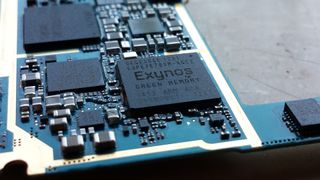Do we really need expandable memory on our phones any more?
As we increasingly look to the cloud, is the end of local storage nigh?
"In reality, all flash memory is riddled with defects – without exception."
Nonetheless, if given the option to buy an entry-level phone and upgrade it with aftermarket memory, many would choose it – especially if they weren't using their phone for the kinds of things that would tax a microSD card regularly.
Adoptable storage
A feature that was introduced with Android 6.0 Marshmallow – adoptable storage – could provide the perfect solution, at least for Google OS-powered phones. Where previously there was a clear separation between internal and external storage, the two are now effectively one and the same.
Adoptable storage essentially formats your microSD card so that it adopts the same structure and permissions as the phone's internal storage, effectively absorbing it into the internal memory.
The key benefits of this are the improved speeds with which the phone can read and write to the card, and the facility to install large apps on it – something that's not possible when the phone 'sees' the card as external memory.

This means you can expand the storage capacity of your phone easily – and for a lower cost than buying a larger-capacity handset.
Another advantage of adoptable storage is security. The card can be formatted to only work in the handset it was set up in, so if the card were to be stolen or cloned it shouldn't work in another device, meaning your data couldn't be accessed.
Get daily insight, inspiration and deals in your inbox
Get the hottest deals available in your inbox plus news, reviews, opinion, analysis and more from the TechRadar team.
However, this is a fairly niche scenario, and would only be an issue if you regularly took the memory card out of your phone and put it back in – something that's not recommended when using adoptable storage, as it can remove files key to the phone's operation.
While adoptable storage sounds like the ultimate solution, there's a reason that manufacturers are wary of adding it in as a feature, even if their phones are running Android 6.
If a card isn't high-enough quality it can't be embedded as internal storage, due to the slower access speeds it can achieve – a phone needs memory that can operate at a certain level, otherwise it would struggle to open and close apps and perform other tasks.
Manufacturers are coming around though. While Samsung refused to include adoptable storage in its Galaxy S7 and S7 Edge phones earlier this year, it's now decided that the feature is robust enough – or maybe it's realised that users have become more savvy – to offer the option in the recent Galaxy Note 7, suggesting it could become a standard feature in future handsets.
The cloud is the future
The thing that could make the issue of where you store your data on the phone moot is cloud storage. Storing your precious photos, music and other files in an online server is now easier than ever – there are plenty of free or cheap options available, all of which are backed up instantly and without prompting.
The only problem comes when you need your stuff but don't have the right connection. As SanDisk's Dennenwaldt says: "The main demand for storage comes from user-created content.
"Have you ever tried to record something in 4K directly to the cloud? Or save something to the cloud where there's no coverage?

He adds: "Local storage and cloud can work together to address the growing user demand for storage."
Storing 4K video locally on a removable microSD card allows for instant saving, quick editing and the ability to swap out for more memory.
Backing that up to the cloud means that even if a card is lost or damaged you still have a way of getting your data back – but that doesn't really help to answer the question of whether we still need memory cards or not.
Luke is a freelance writer and editor with over two decades of experience covering tech, science and health. Among many others he writes across Future titles covering health tech, software and apps, VPNs, TV, audio, smart home, antivirus, broadband, smartphones, cars and plenty more. He also likes to climb mountains, swim outside and contort his body into silly positions while breathing as calmly as possible.
Most Popular


